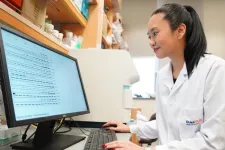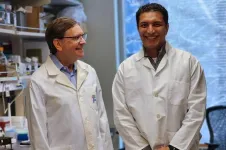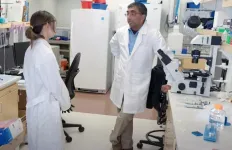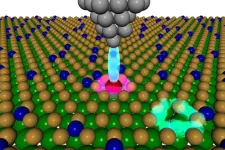(Press-News.org) Jeffrey Spraggins, associate professor of cell and developmental biology, biochemistry, and chemistry, has been named director of the Mass Spectrometry Research Center. He succeeds Richard Caprioli, Stanford Moore Chair in Biochemistry, who established the MSRC in 1998 and who is retiring this summer.
Spraggins is a leading scientist in spatial biology and imaging mass spectrometry—an untargeted molecular imaging approach that enables molecular mapping at cellular resolution—a technology originated by Caprioli. Spraggins’ research lies at the intersection of technology development, data science, and biomedical research. His research group is creating integrated multi-omics pipelines that combine imaging mass spectrometry with various forms of microscopy and spatial transcriptomics to offer a systems biology view of tissues at cellular resolution. By revealing relationships between cellular organization and molecular distributions across spatial and molecular scales, they are creating a toolbox for precision medicine. This work offers novel methods for sub-typing diseases and biomarker discovery. His research group applies these advanced techniques to the study of Alzheimer’s, kidney, and infectious diseases.
“With immense gratitude to Richard for his years of leadership and mentorship, I am thrilled to have the opportunity to lead the MSRC into its next chapter. The unique combination of talented personnel and trainees, immense technical resources, and the interconnectivity between the research and development labs and core services has always made the MSRC a special place for mass spectrometry,” Spraggins said. “My research team develops integrated tools that aim to deliver biological insight, not just data. This will remain our focus as we grow the MSRC, both in terms of the R&D laboratories and the core services offered. I look forward to working with the talented mass spectrometrists at Vanderbilt and our diverse partners, collaborators, and users to identify the analytical needs of the biomedical research community and develop next-generation mass spectrometry and molecular imaging capabilities to advance our research objectives.”
Mass spectrometry is a versatile analytical technology widely used to study the physical, chemical, and biological properties of various compounds. In biomedical research, it is frequently utilized for identifying unknown compounds, conducting qualitative and quantitative analyses of biomolecules (such as proteins, oligosaccharides, lipids, and metabolites), studying protein interactions and structure, and as a tool for pharmacokinetics.
At Vanderbilt, the MSRC brings state-of-the-art mass spectrometry expertise, methodology, and instrumentation to the research and clinical infrastructure across the university and the Vanderbilt University Medical Center. Its current configuration, with three core labs and an R&D function, houses more than 40 mass spectrometers and has served over 250 users over the past 12 months, making it one of the world’s largest academic mass spectrometry centers. In 2023, Vanderbilt and Bruker Daltonics, a manufacturer of scientific instruments for molecular and materials research, established a Mass Spectrometry Center of Excellence, the first center of its kind to be established by Bruker.
“Richard Caprioli’s visionary leadership of the Mass Spectrometry Research Center led to Vanderbilt’s current position at the forefront of advanced research in imaging mass spectrometry. I am delighted that Jeff Spraggins has accepted the position of director of the MSRC, and I am confident that he will lead the center to new pinnacles of achievement in the application of imaging mass spectrometry to biological samples, including the human body,” said John Kuriyan, dean of the School of Medicine Basic Sciences and University Distinguished Professor of Biochemistry and Chemistry.
The MSRC is among the most collaborative biomedical research entities at Vanderbilt: collaborators and users are based in nearly every center and department in VUMC and in many trans-institutional initiatives in Basic Sciences and the College of Arts and Science, including its role as a major part of the facilities available to the Vanderbilt Institute of Chemical Biology, and has many collaborative arrangements with Meharry Medical College. The MSRC also conducts sponsored research in drug metabolism for prestigious pharmaceutical companies, including Merck, Roche, Novartis, Lilly, and Schering-Plough.
Spraggins is the director of the VU Biomolecular Multimodal Imaging Center grant, funded by the National Institutes of Health to build a platform to construct comprehensive 3D molecular atlases of human tissues using integrated imaging and molecular analysis technologies. BIOMIC is part of the Human Biomolecular Atlas Program (HuBMAP), the Kidney Precision Medicine Project (KPMP), and the Human Tumor Atlas Network (HTAN). BIOMIC works with researchers across Vanderbilt and VUMC and the Delft University of Technology in the Netherlands. He is also the principal investigator on multiple research grants from the National Institute of Diabetes and Digestive and Kidney Diseases, the National Institute of Allergy and Infectious Diseases, the National Institute on Aging, and the National Eye Institute.
“We are so thrilled that Dr. Spraggins is the new director of the MSRC! Richard Caprioli built a center that was always on an upward trajectory, supported by his own lab members, by the highly complementary research of Professor Kevin Schey and his lab, and by the staff of the MSRC,” said Charles Sanders, the Aileen M. Lange & Annie Mary Lyle Professor of Cardiovascular Research, vice dean of Basic Sciences, and professor of biochemistry. “We believe Jeff is uniquely qualified to step in to lead the MSRC team to an even higher level scientific of accomplishment and visibility.”
To select the new MSRC director, Dean Kuriyan convened an advisory committee of the four department chairs, led by David Cortez, the Richard N. Armstrong Professor of Innovation in Biochemistry and chair of biochemistry. The committee recognized Spraggins’ growing international reputation, ability to manage large interdisciplinary research teams, and his vision for the future of the MSRC. “Jeff impressed the committee with his plans to unite mass spectrometry research across campus under a common purpose and vision,” Cortez said. Spraggins joined the MSRC in 2009 as a postdoctoral fellow and transitioned to a research faculty position in the biochemistry department in 2013. In 2021, he joined the department of cell and developmental biology as a tenure-track faculty member. He was promoted to associate professor and named a 2024 Chancellor Faculty Fellow in 2023.
Spraggins is a member of the American Association for the Advancement of Science, the American Society of Mass Spectrometry, the Imaging Mass Spectrometry Society, the Human Proteome Organization, and the American Society of Nephrology. In addition, he is a volunteer mentor for Females in Mass Spectrometry, and his laboratory is a host for the HuBMAP Underrepresented Student Internship Program. He received his bachelor’s degree from the College of Wooster in 2003 and his Ph.D. in analytical chemistry from the University of Delaware in 2009.
END
Jeffrey Spraggins named director of Vanderbilt University Mass Spectrometry Research Center
2024-07-17
ELSE PRESS RELEASES FROM THIS DATE:
Duke-NUS finding advances quest to slow ageing
2024-07-17
An ageing population will bring colossal health, social, and economic challenges over the coming decades[1]. As people live longer, staving off the physical decline and frailty that come with age has become a holy grail, with effective interventions projected to unlock significant societal and economic benefits. Estimates suggest that a slowdown in ageing that increases life expectancy by one year alone is worth US$38 trillion.[2]
In a discovery published in Nature, a team of scientists from Duke-NUS Medical School in Singapore may have found a key to slow ageing.
The ...
Logged forests can still have ecological value – if not pushed too far
2024-07-17
Researchers have analysed data from 127 studies to reveal ‘thresholds’ for when logged rainforests lose the ability to sustain themselves.
The results could widen the scope of which forests are considered ‘worth’ conserving, but also show how much logging degrades forests beyond the point of no return.
The first-of-its-kind study, led by researchers from the Department of Life Sciences at Imperial College London with collaborators from around the world, is published today in ...
Exoplanet caught in ‘hairpin turn’ signals how high-mass gas giants form
2024-07-17
UNIVERSITY PARK, Pa. — Astronomers have discovered a planet that has the most oblong orbit ever found among transiting planets. The exoplanet’s extreme circuit — which looks closer to a cucumber than a circle — follows one of the most drastically stretched-out orbits of all known exoplanets, planets that orbit stars outside our solar system. It is also orbiting its star backwards, lending insight into the mystery of how close-in massive gas planets, known as hot Jupiters, form, stabilize and evolve over time.
The research, led by Penn State scientists, was published today (July 17) in ...
Switching off inflammatory protein leads to longer, healthier lifespans in mice
2024-07-17
Scientists at the Medical Research Council Laboratory of Medical Science and Imperial College London have discovered that ‘switching off’ a protein called IL-11 can significantly increase the healthy lifespan of mice by almost 25%.
The scientists, working with colleagues at Duke-NUS Medical School in Singapore, tested the effects of IL-11 by creating mice that had the gene producing IL-11 (interleukin 11) deleted. This extended the lives of the mice by over 20% on average.
They also treated 75-week-old mice – equivalent to the age of about 55 years in humans – with an ...
New gene therapy for muscular dystrophy offers hope
2024-07-17
A new gene therapy treatment for Duchenne muscular dystrophy shows promise of not only arresting the decline of the muscles of those affected by this inherited genetic disease, but perhaps, in the future, repairing those muscles.
The UW Medicine-led research focuses on delivering a series of protein packets inside shuttle vectors to replace the defective DMD gene within the muscles. The added genetic code will then start producing dystrophin, the protein lacking in patients with muscular dystrophy.
Currently, there is no cure for the disease ...
Scientists bridge the 'valley of death' for carbon capture technologies
2024-07-17
A major obstacle for net zero technologies in combatting climate change is bridging the gap between fundamental research and its application in the real world.
This gap, sometimes referred to as ‘the valley of death’, is common in the field of carbon capture, where novel materials are used to remove carbon dioxide from flue gasses produced by industrial processes. This prevents carbon from entering the atmosphere, helping to mitigate the effects of climate change.
Chemists have proposed and ...
Genome recording makes living cells their own historians
2024-07-17
Genomes can now be entrusted to store information about a variety of transient biological events inside of living cells, as they happen, like a flight recorder collecting data from an aircraft.
“Our method, which goes by the acronym ENGRAM, aims to turn cells into their own historians,” said Dr. Jay Shendure, a professor of genome sciences at the University of Washington School of Medicine and scientific director of the Brotman Baty Institute for Precision Medicine. Shendure led the effort, together with Wei Chen, a former graduate student, and Junhong Choi, a former postdoctoral fellow. Junhong ...
USC Schaeffer Institute launches new initiative to improve public policy through behavioral science
2024-07-17
The USC Schaeffer Institute for Public Policy & Government Service announced a new initiative today that leverages behavioral science to create more effective public policy.
The Behavioral Science & Policy Initiative at the USC Schaeffer Institute will conduct research to understand people’s beliefs and behaviors to create policies and communication that better fit people’s needs. The initiative will focus on policy topics such as climate change, health, and food insecurity.
“We want to help policymakers make a difference,” said Wändi Bruine de Bruin, the initiative’s ...
Groundwater is key to protecting global ecosystems
2024-07-17
(Santa Barbara, Calif.) — Where hidden water tables meet the Earth’s surface, life can thrive even in the driest locations. Offering refuge during times of drought, shallow groundwater aquifers act like water savings accounts that can support ecosystems with the moisture required to survive, even as precipitation dwindles. As climate change and human water use rapidly deplete groundwater levels around the world, scientists and policy makers need better data for where these groundwater-dependent ecosystems exist.
Now, a new study maps ...
A new approach to accelerate the discovery of quantum materials
2024-07-17
– By Michael Matz
Researchers at the Department of Energy’s Lawrence Berkeley National Laboratory (Berkeley Lab) and several collaborating institutions have successfully demonstrated an innovative approach to find breakthrough materials for quantum applications. The approach uses rapid computing methods to predict the properties of hundreds of materials, identifying short lists of the most promising ones. Then, precise fabrication methods are used to make the short-list materials and further ...









